THE OUTDATED MODALITY OF OUR PRESENT DAY EDUCATION SYSTEM
It has been programmed into the people, that getting a good education, is the way to get a good job. Nobody wants to end up hungry or homeless, and thus, we put complete faith in an education system as the way and route towards survival. Although I agree that education is crucial, the so-called “education system” we currently have can hardly be called “education”, it is more like indoctrination.
The education system as it stands is trying to meet the future by doing what was done in the past, as it is modelLed on the image and interests of the Industrial Revolution, hence why it was the birth of the Industrial Era that facilitated the need for a public school system. Prior to this, education was the privilege of the clergy and elite. An example of how schooling is rooted in the rise of the industrial era, is evident in how schools are organiSed similar to factory lines, complete with ringing bells, separate facilities, specialiSed into separate subjects. Children are educated by batches, as we put them through the system by age group, much like a batch number and expiry date marks the age of a product. Why is there this assumption that the most important thing kids have in common is how old they are? It is like the most important thing about them is their date of manufacture. If we are interested in creating a model of education that will create a better world, we should not be starting from the “production line” mentality. Our current education is about creating conformity. Every single being is unique and endowed with infinite potential, so are we not deserving of something better?
The education system and society is set up to educate children in a competitive way, as the methodology to track progress has historically been through a competitive process. Hence why education pushes a paradigm of competition instead of collaboration, which ultimately leads to destructive patterns of behavior. Our current schooling paradigm produces children that are either terrified by the tyranny of others, or have been raised to perpetually exploit the conditions of others, without question or conscience, because we are “educated” out of our ability to think for ourselves or engage in critical thinking… but ask yourself, ‘Is there really such a thing as “uncritical thinking”?’
To think is to process information in order to form a view or opinion. But if we are not critical when processing this information, are we really thinking, or are we mindlessly accepting the opinions of others as truth?
Our societies biggest concern should be the mental development of each and every one of the children on this planet. We should motivate each person to their highest potential, without forcing children into ignorance due to to pre determined ideologies and hereditary prejudices. The smarter your kids are, the more they contribute to the overall global intelligence, and thus the world becomes a better place, as everybody becomes a contributor to the greater good. Children will contribute more constructively because everything learnt will be applied to making the world a better place, instead of promoting our current fear based paradigm of war, violence, competition, scarcity and lack.
The world needs to change. We cannot continue to teeter on the precipice of economic and ecological disasters. We cannot continue to exist divided into those who live in abundance and those who live in scarcity. We cannot allow the greed of the few to overwhelm the need of the many. We cannot continue to exploit the planet’s finite resources, in effect, stealing from the future. We cannot continue to draw lines on the planet and separate ourselves into warring factions. For the world to change, new peace leaders and change makers will be needed. The most important question any scholar should ask is:
Will I be one of the peace leaders and change makers, devoting myself to building a better world? Or, will I choose to be detached and complacent in the face of the 21st century’s social, ecological, economic, political and military threats to humanity?
As the little prince, in Antoine de Saint-Exupéry’s book by that name, stated so clearly,
“It’s a matter of discipline… When you’ve finished washing and dressing each morning, you must tend your planet.”
Look around, our beautiful planet needs a lot of tending, and that starts with the education that moulds the minds of our children.
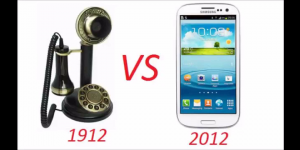

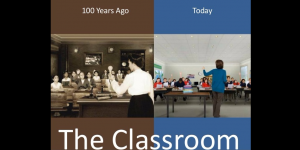
CHALLENGES
The world has become a global village with various cultures and ideologies mixing and clashing, resulting in many problems being faced by those who are reforming our public educational systems around the world. This is largely due to the fact that said education reformers are trying to work out how to educate children to take their place in the world and economy of the twenty first century, given that we can’t anticipate what the world and economy will look like at the end of next year. Given the outdated modality of our present education system, it is important to meet education needs of the future, without making the same mistakes of the past. This in itself is a major challenge, given the ever quickening pace we move at, and let’s face it, there are more and more catastrophes, and economic crashes, “terrorist “ attacks, wars than ever before, all of which shape the economic climate and global narrative. The social, economic and political landscape of our world is always changing.
Another major issue is the cultural aspect. Education reformers are continually faced with the challenge of figuring out how to educate our children so that they have a sense of cultural identity, in order to pass on their specific cultural heritage in order to preserve said culture, whilst being part of the process of globalisation, where cultural influences are diffused through integration and assimilation of varying cultures and background. This is a common conundrum for those who have immigrated or travel frequently, and one probably familiar to many expats who are raising children whilst living in Portugal, and whilst having to assimilate to the local culture.
CREATIVITY AND DIVERGENT THINKING
Creativity is the process of having original ideas that have value. Divergent thinking is an essential capacity in order to be creative. Divergent thinking is the ability to see lots of possible ways of interpreting a question, and possible answers to a question. This is the ability to think laterally, in which one can see convergent ways not linear, where the possibility is multidimensional. Just before children enter school, they are at their most creative, and that creativity is indoctrinated out of them as they go through their education. In fact, test were done where children at preschool level were given a test for divergent thinking. It turned out that 98% of the children tested scored at genius level for divergent thinking. They retested the same children five years later, ages 8 to 10, and the score was 50%. These same kids were tested five years after that it dropped to 10%. One would think that as we get older and get “more educated”, that our capacity for divergent thinking should increase, when in reality it does not, it decreases. What is very evident is, we all have this capacity for creativity and divergent thinking, but it deteriorates as we get older and we are educated and indoctrinated into mediocrity and conformity.
Studies in America have shown that university and college students from top universities have a higher intelligence quotient, or I.Q., before they enter tertiary education, compared with when they leave. The I.Q. actually drops at university level, which means, that supposedly ‘higher’ education is actually making the average person dumber. The true ingenious deceit becomes that much more sickening when you look at the amount of money parents have to fork out for their kids to give them what they perceive is a decent education. What is even sadder, is those who voluntarily enter into debt, choosing student loans, and / or working part time whilst trying to get “educated”.
The question beckons, why is there the need to make everyone’s perspective and thus experience the same with institutionalisation and paralysing forms of education?
Our societies biggest concern should be the mental development of each and every one of the children on this planet, and thus, motivate each person to their highest potential. Because the smarter your kids are, the more they contribute to the overall global intelligence and the better the world will be. Everyone becomes a contributor and we can all work towards contributing on a higher level. They will contribute more constructively because everything learnt will be applied to making society better and making the beautiful planet that is our home, a more peaceful and sustainable place to live.
NEW PARADIGM EDUCATION CONCEPTS
Concepts such as HOME SCHOOLING and WORLD SCHOOLING have become some of the fastest growing trends in recent years, appealing to those who want to take a more proactive and progressive approach to educating their children, and developing their potential in less institutional environments.

As the Co-Founder and Creative Director of Conscious Consumer Network, a live broadcast online TV network that has been running for 5 years, we have had the great privilege of getting to work with many great people pioneering progressive educational modalities. Our online live broadcast network, which was launched on 1 January 2015, has played host to various shows over the years, specifically created to explore various education modalities. One of the most valuable contributions in this area is our longest running show called, FOR THE LOVE OF LEARNING: VOICES OF THE ALTERNATIVE EDUCATION MOVEMENT, which was created by Lainie Liberti. This show explored all kinds of educational modalities, from Waldorf, to Montessori, to Home Schooling, to various challenges faced by parents and youths, when considering ‘unschooling’ their ideas about schooling. There are 127 episodes in various languages, covering many related topics, and featuring education experts and pioneers from around the world. These shows are an amazing resource of information for those who on the UNSCHOOLING / HOMESCHOOLING journey, or are perhaps, considering the options.
Conscious Consumer Network launched a spin-off show called YOUTH ON SUBJECTS OF THE WORLD, which was hosted by many of the kids who had been a part of FOR THE LOVE OF LEARNING and PROJECT WORLD SCHOOL. Whilst producing this show, which featured a panel of teens researching and discussing various topical matters, it became very obvious to us in the Conscious Consumer Network TV studio that there was something different, even special about youths that had not been indoctrinated via mainstream public education. They were more adaptable, smarter and savvier, had great communication and networking skills, and had a far greater grasp on the true nature of reality, and how to navigate it.
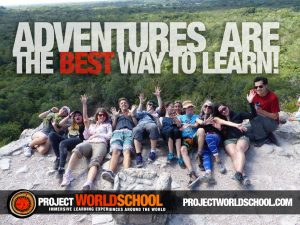
PROJECT WORLD SCHOOL
Founded by Lainie Liberti and her son Miro, PROJECT WORLD SCHOOL is a rich experiential and social learning project that co-creates temporary learning communities around the world for teens and young adults. During these educational retreats, both natural and academic learning occurs through immersive cultural experiences, whilst encouraging social learning, teamwork and leadership. Participants create strong connections to other participants, the community and the world around them, through a rich collaborative environment, with focus on history, local traditions, art, nature, community and sustainability. PROJECT WORLD SCHOOL retreats have been held in many different countries including Peru, Mexico, Thailand, Wales, Japan, Berlin and Budapest.
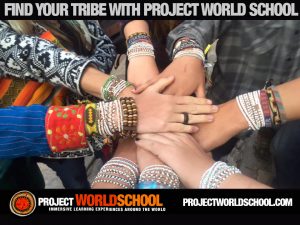
Below is an interview with Lainie Liberti of Project World School
MEL VE: Give us a brief overview of Project world school
LAINIE LIBERTI: What we do is we host temporary learning communities for teenagers and young adults and there is all these different levels of engagement that we facilitate. We do it in different places in the world. From the outside perspective, we are connecting with different communities as world citizens at the same time as creating our own learning community, so there is all these different communities coming together. So from the outside perspective, we are engaging as a global citizen and learning how to see the world through different world views, through the eyes of the people in our host country, and we are doing this from within a learning community
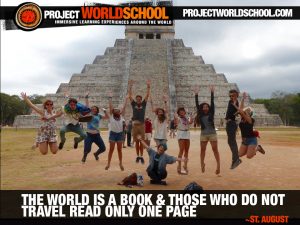
MEL VE: How do you educate children to be part of a world where we are integrating with each other’s cultures, whilst preserving our own specific cultural heritage?
LAINIE LIBERTI: We don’t teach children anything, we are providing opportunities to have these experiences, and because the educational philosophy of which we lay these foundational experiences upon, is a natural learning philosophy, which some call ‘self guided education’, some call it ‘unschooling’, there is all these different names, but in essence is it experiential learning. So we are not teaching, we are providing an opportunity to come together and have these experiences together.
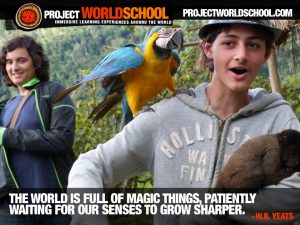
MEL VE: Why are you doing what you are doing?
LAINIE LIBERTI: The thing that is really interesting about what we are doing and why we are doing this with teenagers is, the biological development of a teens brain is the most profound compared with any other time in their development. From zero to seven years of age, their brain is making all these fabulous connections and figuring out how to navigate perception and so forth. But during the adolescent years, from about 13 – 25, that is when the brain is developing much deeper and more profound neural connections. And what that means from a processing perspective is that teenagers are deciding how they fit into this world…. it is the “Who am I? How to I fit in this fabulous place we call ‘The World’”. So at this time of their development, it is the perfect opportunity to facilitate the community aspect of their development, which is based on a humanitarian / person to person connection.

MEL VE: What are some examples of the community connection experience?
LAINIE LIBERTI: So we are going to a farm, and we are staying with indigenous families and we are looking at how they are meeting their needs. How is it that they see the world and what is it that they value, and how can we process that as a group to develop our own foundational perspective if necessity, needs, preferences, and where are the bridges between the two worlds. How is it that we can preserve what is part of our culture, as well as share. It is about this exchange of humanity from different cultures, which builds our world view in a more compassionate way.
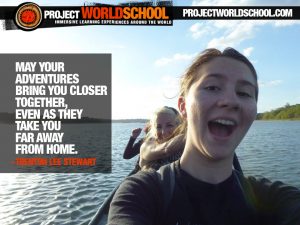
MEL VE: How does this prepare them for their future?
LAINIE LIBERTI: It gives the teenager this bright opportunity to work out how they fit into the world and what their path is going to be for the rest of their lives as part of the human race, as part of the global citizen, which indeed creates a more peaceful planet, starting with the minds of the individual learner. That is our hope, and that is why we love what we do.
MEL VE: What are some of the activities you do as part of Project World School?
LAINIE LIBERTI: We have developed a whole series of team building activities that break down the egos and projected identities that are foisted upon us by modern societies. By living and working together, we are really creating these opportunities for team building, and for each person to also be a leader in their own right. We use some of the fabulous activities you can find from improvisation, such as how to work with another person, how to say yes and take what they have given you, and instead of judging it, build upon it, how to trust, how to step outside of your comfort zone. So we do all this team building stuff, then we go out into the outside world and have all these fabulous cultural experiences. At the end of every day, we do a reflection. The reflection is sometimes internal, you know, how is it that I am processing this. Or sometimes it is an external observation such as how are people in our host country processing something. So it is a whole series of activities that we are doing as a community, and this is community building at its core.
MEL VE: How do the teens find these experiences?
LAINIE LIBERTI: In general, once these teens have gone through these experiences, they want to come back again and again and again.
To get to grips with the vast plethora of options available to people who may be considering unschooling from the standardised institutions, please check out the vast array of education options available to those who are wanting to explore the alternatives. FOR THE LOVE OF LEARNING – VOICES OF THE ALTERNATIVE EDUCATION MOVEMENT is a vast resource, with over 100 videos, to assist in the transition from mainstream to alternative education.
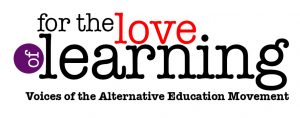
http://fortheloveoflearningshow.com/
PROJECT WORLD SCHOOL
https://projectworldschool.com/
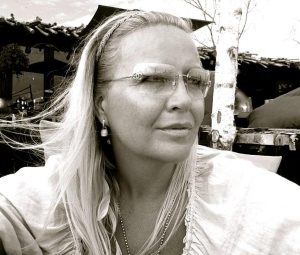
Article written and researched by
